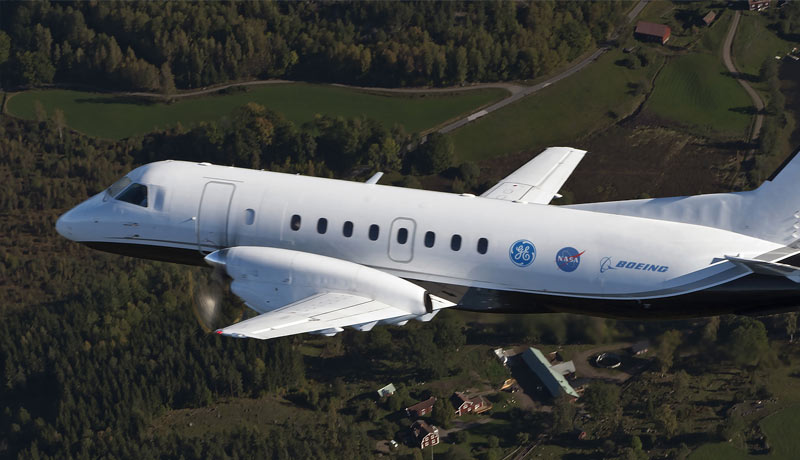
GE Aviation has chosen Boeing to assist flying testing of its hybrid electric propulsion system, which will use a modified Saab 340B aircraft and CT7-9B turboprop engines, announced a company statement.
Boeing and its subsidiary Aurora Flight Sciences will supply GE Aviation with aeroplane modification, system integration, and flight-testing services, according to the statement.
Manufacturing of nacelles, flight deck interface design and software, aircraft-level performance study, and systems integration are all part of this endeavour.
Previously, NASA and GE Aviation announced the formation of new research cooperation to develop a megawatt (MW) class hybrid electric propulsion system for single-aisle aircraft flight readiness. Ground and flight testing are scheduled for the mid-2020s. The initiative, which is part of NASA’s Electrified Powertrain Flight Demonstration (EPFD) project, is a $260 million five-year endeavour that includes contributions from NASA, GE Aviation, Boeing, and other partners.
“We are excited about the opportunity to collaborate with Boeing to advance hybrid electric and electric propulsion systems,” said Mohamed Ali, vice president and general manager of engineering for GE Aviation.
“NASA’s Electrified Powertrain Flight Demonstration project is an opportunity for GE Aviation and Boeing, world leaders in aviation technologies, to show hybrid electric propulsion is real and possible for the future of commercial flight to reduce carbon emissions,” Ali added.
“We’re inspired to be joining GE Aviation in demonstrating the viability of hybrid-electric propulsion technology. We’re pleased to contribute our extensive research and testing of hybrid electric propulsion systems—including a longstanding development partnership with NASA—for a project that will no doubt be an important milestone on the path to more sustainable air travel,” said Naveed Hussain, Boeing chief technology officer and vice president and general manager of Boeing Research & Technology.
Aurora’s headquarters in Manassas, Virginia, will house aircraft systems engineering and testing, while nacelle manufacture will take place in Mississippi and West Virginia.
“We are proud to contribute Aurora’s expertise in aircraft components, systems engineering, and testing to this important project,” said Per Beith, president and CEO of Aurora Flight Sciences. “Working with GE Aviation, we will make a significant impact on the advancement of electrified propulsion for commercial air transport.”
For more than a decade, GE Aviation has been developing components of high-power hybrid electric systems such as motors, generators, power converters, and power management systems. GE Aviation’s hybrid electric technologies are extremely compatible with Sustainable Aviation Fuel and hydrogen, as well as modern engine architectures such as the open fan and new compact engine core designs.
Hybrid electric propulsion solutions can assist the aviation industry meet its goal of net-zero CO2 emissions from flight by 2050 by saving fuel and optimising engine performance.
